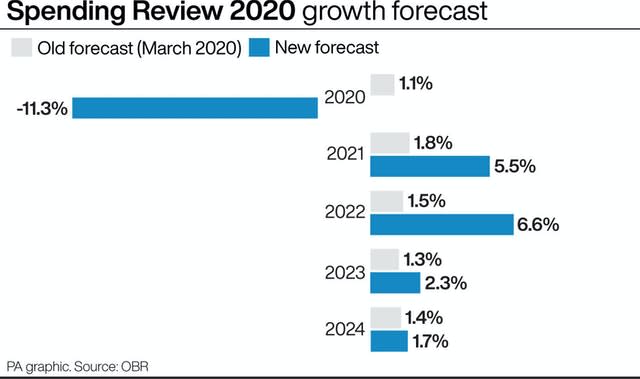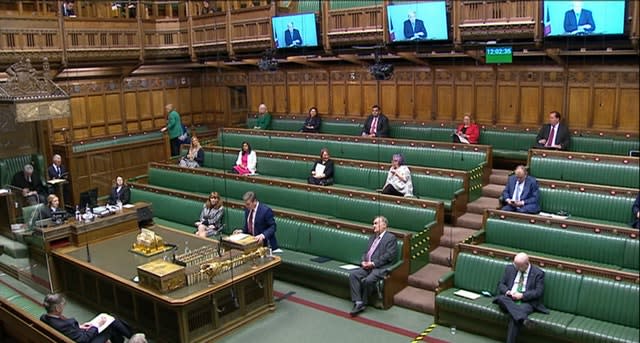Spending Review live: Chancellor sets out plans for the next year
Chancellor Rishi Sunak is delivering his Spending Review in the House of Commons, laying bare the damage done by coronavirus to the economy and public finances.
Mr Sunak said that the UK’s “economic emergency has only just begun” and that the Government was providing £280 billion this year to get the country through the coronavirus crisis.
Here’s the latest from Westminster:
1.11pm
Concluding the Spending Review, Rishi Sunak said: “Today Government has funded the priorities of the British people, and now the job of delivering them begins.”
1.10pm
Rishi Sunak said the schools budgets will increase next year by £2.2 billion, before he turned to a temporary cut in overseas aid spending.
He told MPs: “During a domestic fiscal emergency, when we need to prioritise our limited resources on jobs and public services, sticking rigidly to spending 0.7% of our national income on overseas aid is difficult to justify to the British people – especially when we’re seeing the highest peacetime levels of borrowing on record.
“I have listened with great respect to those who have argued passionately to retain this target. But at a time of unprecedented crisis, government must make tough choices.”
He said 0.5% of national income will be spent on overseas aid in 2021 – the equivalent of £10 billion in the Spending Review – before noting: “Our intention is to return to 0.7% when the fiscal situation allows.”
1.09pm
A new “UK infrastructure bank” – headquartered in the north of England – to finance major new projects will be established, Rishi Sunak said.
The Chancellor said he is establishing a new £4 billion “levelling up” fund to finance local infrastructure improvement projects.
1/ Today I’m announcing a new Levelling Up Fund worth £4bn.
Any local area will be able to bid directly to fund local projects.
Projects must have real impact, and they must be delivered within this Parliament. #SR20 pic.twitter.com/iasqTJ6XWL
— Rishi Sunak (@RishiSunak) November 25, 2020
1.08pm
The Chancellor said total domestic UK-wide funding will “at least match EU receipts” while the “core health budget” will grow by £6.6 billion next year.
He also said the settlement will allow local authorities to increase their “core spending power by 4.5%”, noting: “Local authorities will have extra flexibility for council tax and the adult social care precept – which together with £300m of new grant funding gives them access to an extra £1 billion to fund social care.
“This is on top of the extra £1 billion social care grant we provided this year, which I can confirm will be maintained into next year.”
1.07pm

1.06pm
Total departmental spending next year will be £540 billion, with day-to-day departmental spending rising, in real terms, by 3.8%, the Chancellor said.
The overseas aid budget will be cut to 0.5% of gross national income in 2021, Mr Sunak confirmed, but he said the Government’s “intention” was to return to 0.7% when the fiscal situation allows.
1.05pm
Rishi Sunak said the Government would increase the National Living Wage by 2.2% to £8.91 an hour.
1.03pm
The 2.1 million public sector workers who earn below the median wage of £24,000 will be guaranteed a pay rise of at least £250 next year, Mr Sunak said.
The Chancellor said NHS doctors and nurses will receive a pay rise, but pay rises in the rest of the public sector will be “paused” next year.
Mr Sunak said nearly £3 billion would be provided to Work and Pensions Secretary Therese Coffey to deliver a new three-year “restart programme” to help more than one million people who have been unemployed for more than 12 months to find new work.
He added unemployment is predicted to rise to a peak of 7.5% – or 2.6 million people – in the second quarter of 2021.
The Chancellor also said: “Unemployment is then forecast to fall in every year, reaching 4.4% by the end of 2024.”
1pm
Rishi Sunak said underlying debt is forecast to be 91.9% of GDP this year and is forecast to continue rising – reaching 97.5% of GDP in 2025/26.
On the Office for Budget Responsibility’s economic forecasts, Mr Sunak said the economy will “contract this year by 11.3%, the largest fall in output for more than 300 years”.
He said: “As the restrictions are eased, they expect the economy to start recovering – growing by 5.5% next year, 6.6% in 2022, then 2.3%, 1.7% and 1.8% in the following years.
“Even with growth returning, our economic output is not expected to return to pre-crisis levels until the fourth quarter of 2022 – and the economic damage is likely to be lasting. Long-term scarring means, in 2025, the economy will be around 3% smaller than expected in the March Budget.”
Mr Sunak said the UK is forecast to borrow a total of £394 billion this year, equivalent to 19% of GDP, telling MPs: “The highest recorded level of borrowing in our peacetime history.
“Borrowing falls to £164 billion next year, £105 billion in 2022/23, then remains at around £100 billion, 4% of GDP, for the remainder of the forecast.
“Underlying debt – after removing the temporary effect of the Bank of England’s asset purchases – is forecast to be 91.9% of GDP this year.”
12.55pm
Rishi Sunak said the Government is providing £280 billion to “get our country through coronavirus”, telling MPs: “Next year, to fund our programmes on testing, personal protective equipment and vaccines, we are allocating an initial £18 billion.”
The Chancellor said £3 billion would be provided to support NHS recovery – allowing them to carry out up to one million checks, scans, and operations – while more than £2 billion will be spent on transport, with funding to subsidise rail networks.
He added: “And while much of our coronavirus response is UK-wide, the Government is also providing £2.6 billion to support the devolved administrations in Scotland, Wales and Northern Ireland.
“Taken together, next year, public services funding to tackle coronavirus will total £55 billion.”
Taken together, public services funding to tackle coronavirus will total £55bn next year.
This will help fund programmes on mass testing, test and trace, personal protective equipment, and vaccines. #SR20 pic.twitter.com/7r9KgFxGF4
— Rishi Sunak (@RishiSunak) November 25, 2020
12.51pm
Chancellor Rishi Sunak said that the UK’s “economic emergency has only just begun” and that the Government was providing £280 billion this year to get the country through the coronavirus crisis as he set out his Spending Review in the House of Commons.
The Office for Budget Responsibility is forecasting the economy will contract this year by 11.3%, the Chancellor said.
12.50pm
The Chancellor said the Spending Review “delivers on the priorities” of the British people, telling the Commons: “Our health emergency is not yet over, and our economic emergency has only just begun.
“So our immediate priority is to protect people’s lives and livelihoods.”
Rishi Sunak said the Spending Review seeks to deliver “stronger public services” and it will deliver a “once-in-a-generation investment in infrastructure”.
12.45pm
Chancellor Rishi Sunak has risen to deliver his Spending Review.
12.25pm

12.15pm
The advance copy of the Chancellor's Spending Review has arrived – earlier than usual, but just as redacted… 🤦 #SpendingReview pic.twitter.com/WoUCtmQ5tJ
— Alison Thewliss (@alisonthewliss) November 25, 2020
12pm
Ahead of the speech, former Labour leader Jeremy Corbyn joined a number of the party’s MPs in writing a letter to the Chancellor about statutory sick pay, despite the fact he is now an independent.
Mr Corbyn recently had the party whip removed by successor Sir Keir Starmer over his response to a report in to anti-Semitism.
The Chancellor must increase Statutory Sick Pay and extend it to all in today's #SpendingReview.
By ensuring everyone can afford to self-isolate, proper sick pay helps slow the spread of #coronavirus.#SickPayForAll pic.twitter.com/CXk5Tg68YS
— Jeremy Corbyn (@jeremycorbyn) November 25, 2020
11.50am
Individuals, families and communities must become stronger, healthier and happier as a result of this Spending Review.
That is the true measure of our success.
Watch live after PMQs #SR20 pic.twitter.com/smQhWTbrJS
— Rishi Sunak (@RishiSunak) November 25, 2020
11.30am


 Yahoo Movies
Yahoo Movies 
